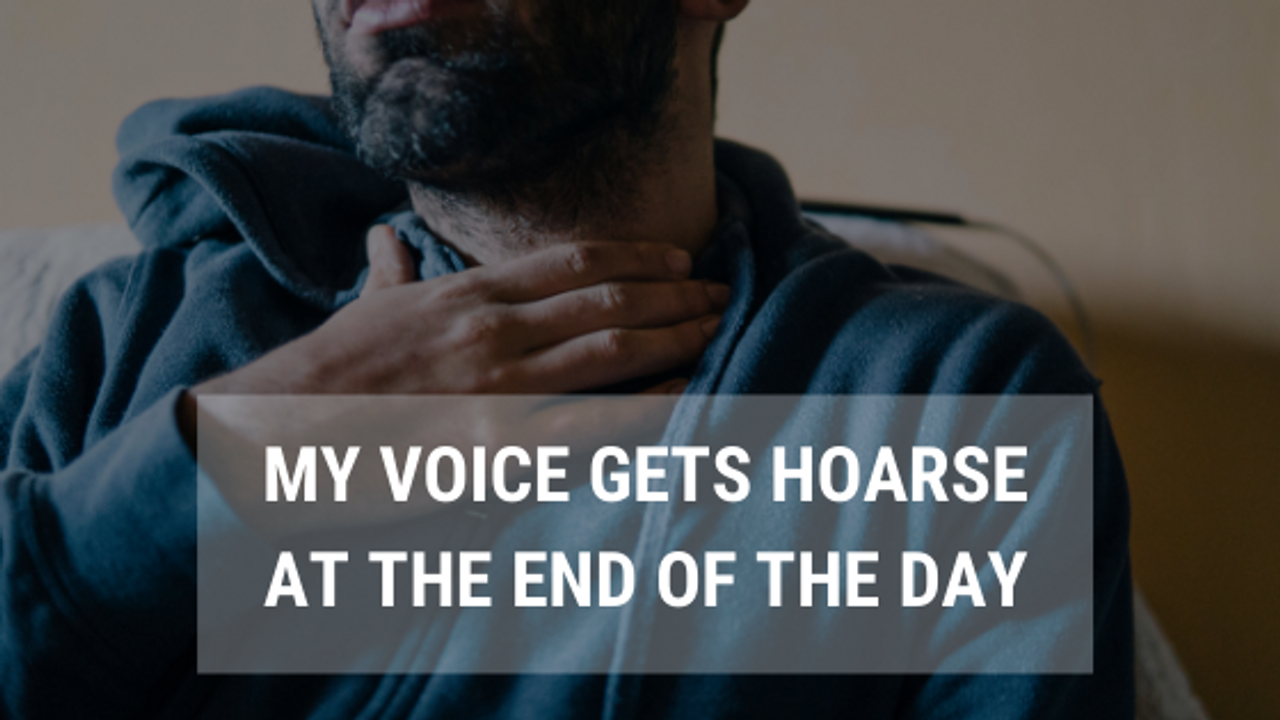
My Voice Gets Hoarse at the End of the Day
If your voice gets hoarse at the end of the day, let me tell you why this is happening and what you should be doing about it.
If you experience hoarseness occasionally in the evenings, or if your voice gets hoarse every day after talking, you should know that it does not have to be that way. In fact, it should not be that way. Speaking shouldn’t feel painful and you shouldn’t end up with a hoarse voice at the end of the day even if you talked all day. So, why is this happening to you?
Causes of Hoarseness
That strained, raspy, husky, rough or breathy quality of voice that gets worse as the day goes by usually indicates a functional problem. For example, the muscles in and around the larynx squeeze or constrict, they get tired and therefore they are unable to make a clear tone.
Worsening hoarseness with voice use usually does not indicate a structural change on the vocal folds, like vocal nodules or cysts. But sometimes, post-nasal drip or other medical conditions can cause hoarseness that gets worse throughout the day because the tissue of the vocal folds gets more and more irritated.
Generally speaking, there are two main reasons why you may end up with a hoarse voice in the evening:
Two Reasons of Hoarse Voice
Reason #1: Voice Use for Too Long
If you use your voice for long periods of time, longer than what your voice is conditioned to right now, you can experience hoarseness of voice. Every time you speak, the vocal folds touch each other hundreds and thousands of times. With every contact, cells from the most superficial layer of the vocal folds are lost.
But vocal folds are a wonderful human organ able to self-repair very fast. It takes only five days to completely renew the superficial layer of the vocal folds, if you give your voice a chance to heal. However, if you continue using your voice without breaks, the vocal folds simply don’t have the power to restore and repair on the go.
There are 2 things that I recommend if you need to use your voice for long periods of time regularly:
1. Schedule voice breaks into your day.
2. Improve vocal endurance and stamina with regular vocal exercises.
Watch this video for demonstrations and more details:
Link to the video: https://www.youtube.com/watch?v=YCM0862a--k
Reason #2: Too Much Muscle Work
Motor patterns that lead to unwanted constriction, tension and strain at the level of the larynx when speaking can lead to more pronounced hoarseness at the end of the day. Muscle over-work can come from any part of the body, including your breathing muscles, postural muscles, neck muscles or muscles in and around the larynx.
There are no quick fixes for this. And vocal rest will not solve this problem. The solution is a process that involves education, exploration and finding the best ways to produce sounds without tension. It may include working with breathing, vocal fold closure, resonance of the vocal tract, alignment of your whole body and others.
I personally like to work with individual vocal structures in isolation as much as possible. For example, we can explore vocal fold closure that is not affected by muscle work in other body parts. And the great thing is that we can isolate the work of several parts of the vocal mechanism and train making sounds and speaking without creating tension and strain.
If you are experiencing vocal strain, tension or even pain when speaking, and you are ready to work with me towards a free, strong and confident voice, you can apply to our Vocal Freedom System coaching program. Check out this link to learn more and sign up.
Reminder
If your hoarseness lasts for more than 2 weeks without the presence of an acute infection, such as a common cold or flu, go and get your voice properly evaluated by a laryngologist to prevent a serious vocal problem.

